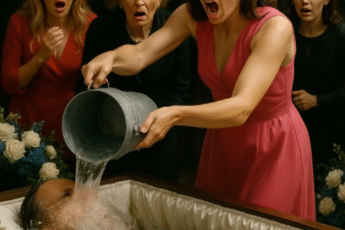In a small, single-story house in Sacramento, where the morning sun danced across the windowsills, Rachel Thompson was orchestrating the familiar symphony of her morning routine. The sweet, buttery aroma of pancakes filled the kitchen, a counterpoint to the bitter scent of freshly brewed coffee. Her husband, David, sat at the dining table reading the newspaper, his tie already loosened in a characteristic gesture of domestic comfort. On the surface, it was a life of ordinary, fulfilling peace.
“Emma, breakfast!” Rachel called.
Her eight-year-old daughter came running down the stairs, a whirlwind of brown ponytail and plaid school uniform. She started to slide into the chair next to her father, then hesitated, a flicker of something unreadable in her eyes.
“I’ll sit over there instead,” she said, choosing a chair on the opposite side of the table, creating a small, deliberate distance.
David looked up from his paper, a wry smile playing on his lips. “Emma’s been wanting to keep her distance from Dad lately. I think she’s hitting puberty early.”
“She’s only eight,” Rachel laughed, placing a stack of pancakes on Emma’s plate. But a small, nagging worry had already taken root. For the past few months, Emma, who used to leap into her father’s arms, now often watched him from afar, her expression a mixture of love and deep confusion.
As if on cue, Emma wrinkled her nose. “Dad, you smell different,” she murmured into her fork.
“Different?” Rachel frowned. “What kind of different?”
“I don’t know,” Emma said, shaking her head. “It’s not your smell. It’s… someone else’s.”
David chuckled, a smooth, easy sound. “Must be the new shampoo I’m using, honey. Or maybe the hair product I keep at the office.”
Rachel nodded, accepting the simple, logical explanation. But the image of her daughter’s puzzled face lingered. As if to break the strange tension, David put a hand to his forehead, groaning softly. “Another headache. I just can’t seem to shake this fatigue.”
“You’ve had so many business trips,” Rachel said, her concern immediate as she retrieved the aspirin. “Don’t push yourself so hard.”
David was a sales manager, often away for two or three days a week. It was a life of constant motion, but he always came home to them. He took the pills she offered, kissing her hand. “I’m so lucky to have you, Rach.”
Emma watched them, her expression uncharacteristically solemn. Just a few months ago, she would have rolled her eyes and groaned, “Gross!” Now, she was just… watching.
The ordinary Tuesday morning unfolded. Rachel dropped Emma at school and headed to her own part-time job as an office clerk. She was organizing files just after two o’clock when her cell phone rang. Sacramento General Hospital. Her heart seized. Calls from hospitals were never good news.
“Mrs. Thompson?” a professionally calm voice asked. “This is the emergency department. Are you the wife of David Thompson?”
Rachel’s hands began to shake. “Yes. Has something happened?”
“Your husband has been in a traffic accident,” the voice said, the words precise and devastating. “He’s in critical condition. Could you please come to the hospital immediately?”
The world dissolved into a blur of buzzing fluorescent lights and the distant, muffled sound of her own panicked breathing. She somehow managed to explain the situation to her supervisor, her own voice sounding foreign and distant. The drive to the hospital was a nightmare of red lights and worst-case scenarios. David’s smile that morning, his kiss, his parting words—I should be home by tonight—echoed in her ears like a cruel taunt.
At the hospital, a grim-faced doctor named Johnson led her to a small, sterile consultation room. “Your husband’s car was struck by a vehicle that ran a red light,” he explained, his voice gentle but direct. “He suffered severe head trauma. He’s unconscious. To be honest, his condition is very precarious. Tonight will be a critical period.”
Unconscious. The word was a black hole, sucking all the air from the room. Just hours ago, he had been complaining about a headache. Now, he was fighting for his life. After a frantic call to Emma’s school, Rachel drove to pick up her daughter, her mind a chaotic mess of how to explain the unexplainable.
“Dad was hurt a little, sweetie,” she said, her voice trembling despite her best efforts. “We’re going to go visit him.”
In the ICU, the sight of David broke them both. He lay still as stone, his head bandaged, his body a nexus of tubes and wires connected to machines that beeped and breathed for him.
“Daddy!” Emma’s cry was a raw, terrified wail. “Daddy, wake up!”
Rachel wrapped her arms around her daughter, her own tears a hot, silent stream down her face. A nurse encouraged them to talk to him, and they did, their voices small and desperate in the face of the rhythmic hiss of the ventilator.
That night, Rachel kept vigil in the waiting room, Emma asleep with her head in her lap. The next morning, the doctor delivered a sliver of hope: David had made it through the night. He was stable. But he remained locked in his silent, comatose world.
Three days passed in a blur of beeping monitors and hushed conversations. David’s condition slowly improved. His eyelids would occasionally flutter. Rachel and Emma fell into a new, surreal routine of school, work, and hospital visits, their lives revolving around the quiet, unresponsive man in the ICU bed.
On the third night, just as visiting hours were drawing to a close, Emma suddenly froze, her head cocked. She was listening intently to a sound from the corridor—the sharp, confident click of high heels on linoleum, a sound distinctly different from the soft-soled shoes of the nursing staff.
“Mom,” Emma whispered, a strange fear in her voice. Before Rachel could ask what was wrong, Emma grabbed her arm, her small hands surprisingly strong. “Hide. We have to hide.”
She pushed Rachel toward a small supply closet in the corner of the room. “Emma, what are you doing?” Rachel asked, bewildered and alarmed.
“You’ll see,” Emma whispered, her face pale and serious. “Please, Mommy. Just be quiet.”
Rachel crouched in the cramped darkness, her heart hammering against her ribs. She peered through a thin crack in the door. The footsteps stopped outside. The door to the ICU room swung open.
A woman stepped inside. She was blonde, attractive, and wearing a nurse’s uniform. She walked directly to David’s bed, took his hand, and leaned down to kiss his forehead. It was a gesture of profound, wifely intimacy.
“Who are you?” Emma’s voice was small but brave.
The woman looked down, a cold, dismissive smile on her face. “I’m Jennifer,” she said. “I’m a nurse at this hospital.” She paused, letting the silence stretch. “And I’m David’s wife.”
The world inside the closet went silent and airless. Wife? It had to be a mistake. A cruel, insane mistake.
“That’s a lie!” Emma cried. “My mom is Dad’s wife!”
Jennifer reached into her purse and pulled out a folded document. A marriage certificate. She held it out for Emma to see. David Thompson and Jennifer Miller. Married ten years ago.
Rachel’s knees buckled. Ten years ago. She and David had been married for five.
“But Dad is our dad,” Emma protested, her voice thick with tears.
Jennifer’s voice turned to ice. “David and I are the real married couple. We have a son. Michael. He’s seven.”
A son. The words were a physical blow. In the suffocating darkness of the closet, Rachel felt the carefully constructed reality of her life shatter into a million pieces. David’s frequent business trips. Emma’s insistence that he smelled of “someone else.” The unease she had brushed away for months. It wasn’t a failing marriage. It was a fake one.
Rachel couldn’t stand it anymore. She pushed open the closet door and stepped out into the harsh fluorescent light.
Jennifer turned, surprised but not flustered. “Ah, the mother,” she said, her eyes raking over Rachel with contempt. “The ‘other woman’ David was always talking about.”
“I am his wife,” Rachel said, her voice shaking with a fury that was just beginning to ignite. “Rachel Thompson. We were married five years ago.”
Jennifer laughed, a sound devoid of all humor. “Poor thing. You’ve been deceived. David and I were married first. Your marriage isn’t real.” She held up her certificate again. “This is reality. I’m his emergency contact. I’m his legal spouse. When he wakes up, he’s coming home to his real family.”
Jennifer swept out of the room, leaving a vortex of devastation in her wake. Rachel sank to the floor, pulling a sobbing Emma into her arms. But she could no longer offer the comfort of a lie. The perfect family she had cherished just minutes before had been revealed as a long, elaborate fraud.
The days that followed were a methodical, painful unraveling of a five-year lie. A visit to the hospital records office confirmed it: Jennifer Miller was listed as David’s spouse and emergency contact. A consultation with a lawyer confirmed her worst fears. Her own marriage certificate was legitimate, but since it came second, it was legally invalid. Her husband was a bigamist. Their life together was a sham.
She hired a private investigator, a weary-eyed man named Tom Harris who wasn’t surprised by her story. “More common than you think,” he’d said. “Especially with men who travel for work.”
The results came back in two days, a cold, factual report that detailed the architecture of David’s deception. Two registered addresses. Two families, one in the city, one in the suburbs. Two bank accounts where he skillfully divided his salary. He had told Jennifer he traveled for sales. He had told Rachel the same thing. For five years, he had spent half the week with each family, a meticulous curator of his double life.
When Rachel returned to the hospital, David was awake. Jennifer was sitting by his bed.
“Rachel,” he whispered, his eyes filled with a weak, pathetic guilt.
“I want an explanation,” she said, her voice devoid of its usual warmth. “All of it.”
And so he confessed. He had met Rachel five years into his marriage with Jennifer. He’d fallen for her, but couldn’t bring himself to leave his first family. So he chose not to. He chose to have both.
“I loved you both,” he said, tears rolling down his cheeks. “I didn’t want to lose either of you.”
“Love?” Rachel’s voice was laced with a bitterness that was new to her. “You don’t love people you lie to. You don’t build a family on a foundation of deceit.”
Jennifer, her own face a mask of cold fury, produced a photo of a small boy with David’s eyes. Michael. Emma’s half-brother.
“Our marriage is the one that’s legally real,” Jennifer stated, her voice sharp. “You have no legal rights here. You can’t even claim support.”
At that moment, the door opened. Rachel’s lawyer stepped inside. “That’s incorrect,” she said firmly. “Ms. Thompson is the victim of a fraudulent marriage. She is entitled to damages and child support. Furthermore, your husband, Mr. Thompson, is facing criminal charges for bigamy and fraud.”
David buried his face in his pillow, the castle of lies he had so carefully constructed finally crumbling around him.
Rachel walked out of that room and didn’t look back. Emma was waiting in the hallway.
“Mom, did Dad tell the truth?” she asked.
Rachel knelt down and looked her daughter in the eye. “Yes, honey. He did. And from now on, it’s going to be just you and me. We’re going to start a new life.”
“Will we be okay?” Emma whispered.
“We’ll be better than okay,” Rachel said, a new, steely resolve hardening within her. “Because we’re a real family.”
Six months later, Rachel and Emma were hanging laundry on the balcony of their new, smaller apartment. The legal battles were over. David, his career and reputation in ruins, was paying court-ordered support. Jennifer had divorced him, starting her own new life with her son. The two women, once rivals in a drama neither had written, had recognized each other for what they were: victims of the same man’s profound selfishness.
The wounds were still there, but they were healing. Rachel had a new, full-time job. Emma was thriving in a new school. Their life was smaller, simpler, but it was honest.
“Mom,” Emma asked one evening as they prepared dinner. “What is a real family?”
Rachel stopped chopping vegetables and looked at her daughter, her wise, intuitive child who had sensed the lie long before she had. “A real family,” she said, “is people who trust each other. Who don’t lie. Who show up for each other, no matter what. It’s not about a piece of paper. It’s about hearts that are connected.”
Emma nodded, a slow, serious expression on her face. “Then we’re a real family.”
“Yes,” Rachel said, her heart swelling with a love that was pure and true. “The best family in the world.”
Outside the window, the sun was setting. Wrapped in a quiet, hard-won happiness, mother and daughter moved forward, hand in hand, into a future built not on a perfect illusion, but on the unbreakable foundation of the truth.




